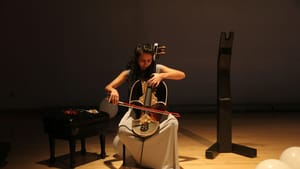Stay in the Loop
BSR publishes on a weekly schedule, with an email newsletter every Wednesday and Thursday morning. There’s no paywall, and subscribing is always free.
A mother’s musical journey
Philly Fringe 2024: Deniz Khateri presents A Bach’eh who wanted to become Bach

If you’re ever doubting how much you could accomplish in 40 minutes, just ask Deniz Khateri. Into that short span, she packs nine months of pregnancy, a reconciliation with her Persian heritage, and a good amount of live music as part of her one-woman Fringe show, A Bach’eh who wanted to become Bach.
Mother and motherland
The story centers around Khateri’s discovery that she is pregnant while living alone in New York. Khateri plays a young poet and musician of Persian heritage who, at least initially, wants neither the baby nor her cultural background. She insists that Bach, Beethoven—these are her masters. In job interviews, she resolutely insists that she is from Massachusetts and is suspicious when others note her accent. As the piece progresses, however, Khateri finds herself falling in love with the being inside her, who is creatively represented and spoken for by the gourd-shaped instrument that she plays, a Persian Qeychack. This dialogue between expectant parent and child also operates as a dialogue between mother and motherland, as Khateri grapples with the Qeychack’s imperfect reproduction of Bach’s music, which she so admires, and its organic musical voice.
For a one-woman show, A Bach’eh has remarkable dimension because of resourceful ways that Khateri conjures additional characters. There is her useless boyfriend, represented by a series of text messages projected on a giant screen behind Khateri. There’s the Qeychack-baby. There are one-sided phone conversations and interviews and amusing impressions of the inane things people say to women about pregnancy and childbirth. There are Khateri’s poems and songs, and the ones she remembers from her mother. Apart from illustrating Khateri’s range and multifaceted talent, these touches create a sense of constant dialogue despite the single actor.
Crafting a journey
The sound and set design were also impressive, though simple. The performance takes place on a square, curtainless stage in the Icebox Project Space. Khateri’s collaborator, composer Bahar Royaee, sits at a table off-center, acting both as Khateri’s silent witness and, more practically, as the stagehand and sound cue controller. Most hypnotizing were beautiful shadow puppets that Khateri—drawing on yet another artistic skill—projected onscreen, facilitating on-stage transitions while also symbolically marking inflection points in the story.
Although the show was ambitious and well-conceived (so to speak), there were some kinks. Without curtains, the performance effectively began as soon as the audience started filing in, Khateri wordlessly acting out the nausea of early pregnancy in a kind of dynamic tableau. This was a resourceful solution to the lack of a hiding place, but it seems that Khateri and her team underestimated how long it might take the audience to get settled, leading to some awkward repetition.
A Bach’eh is an ambitious piece exploring epic events—pregnancy, war, immigration—in a kernel of time with a pebble of a budget. If, in moments, the symbolism was a bit heavy-handed, this was more than made up for by the privilege of seeing live theater in such an intimate, vulnerable setting. And the show passed the most important test: my friends and I talked about it the whole car ride home.
What, When, Where
A Bach’eh who wanted to become Bach. Written and performed by Deniz Khateri, composed by Bahar Royaee. $25; pay-what-you-can options are available. September 6-8, 2024, at the Icebox Project Space Gallery, 1400 N American Street, Philadelphia. (215) 413-1318 or phillyfringe.org.
Accessibility
Recommended for ages 18+. The performance space is located on the first floor, with ramps from the street level. Masks are provided at the theater door and required inside.
Sign up for our newsletter
All of the week's new articles, all in one place. Sign up for the free weekly BSR newsletters, and don't miss a conversation.

 Lowry Yankwich
Lowry Yankwich